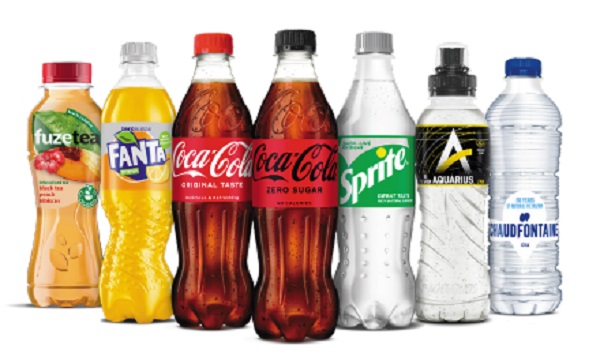 Credit: Coca-Cola
Credit: Coca-Cola
Coca-Cola Belgium & Luxembourg has announced that the brand will soon switch from virgin plastic to 100% recycled plastic for its bottles (with the exception of the bottle cap and label).
From this summer, all bottles of Coca-Cola, Fanta, Sprite and other company brands in Belgium and Luxembourg will be made from 100% recycled plastic. This investment of more than €10 million euros per year will save 14,000 tonnes of virgin plastic each year and will have a positive impact on CO2 emissions: 100% recycled plastic has a carbon footprint reduced by up to 70% to that of virgin plastic of fossil origin.
“We are thus taking a big step towards circular plastic packaging with reduced CO2 emissions, the result of collaboration with the entire sector,” commented An Vermeulen, Country Director Belgium-Luxembourg at Coca-Cola European Partners (CCEP).
Packaging today represents no less than 43% of the total CO2 emissions of CCEP's activities. One of the main objectives of the company's sustainability strategy is therefore to make packaging more sustainable, which has a positive impact on CO2 emissions.
Four years ago, Coca-Cola launched its ambition to use less packaging wherever possible, collect 100% of the bottles sold by 2025 and ensure that at least 50% of the material used for our plastic bottles was recycled plastic, the aim being to accelerate the transition to 100% recycled plastic (rPET) across Western Europe by 2030.
Coca-Cola in Belgium and Luxembourg is one of the first companies in Europe to have achieved this latter ambition.
“We have made it one of the cornerstones of our policy, so that people can enjoy our drinks in an increasingly sustainable way. And we are investing heavily: the switch to 100% rPET represents an investment of more than €10 million per year”, added An Vermeulen. “By the end of last year, we had already achieved a switch to at least 50% rPET in all of our bottles. Six months later, we are at 100%, which means that in Belgium and Luxembourg we no longer use virgin plastic from fossil raw materials for our plastic bottles. Thus, we will save 14,000 tonnes of virgin plastic each year and significantly reduce our carbon footprint. The Luxembourg water brand Rosport, distributed by Coca-Cola European Partners, will also no longer use virgin plastic for its water bottles after the summer".
However, the company's ambition extends beyond this. "Thanks to innovation, we want to use less packaging when possible and we plan to collect one bottle for each bottle sold, in order to make a new one", explained An Vermeulen. “The next important step is to make our packaging circular by 2025. To achieve this, bottle collection needs to improve further. Currently, 72% of our bottles are collected in Luxembourg. It is not always easy to collect packaging on public roads, so bottles sometimes end up as litter in the wild".
“We want to continue to use the power of our brands to encourage consumers to sort our packaging the right way and certainly not throw it away”, commented Thomas Oth, Country Director Belux at Coca-Cola Services. “This summer, we will launch a marketing campaign - as we did in 2019 - where we will inform our consumers, through our ads and on our bottles, of the arrival of these 'new' bottles and ask them to help us recycle them".
An Vermeulen added: "Above all, we focus on innovations that promote circularity. Indeed, unlike materials like glass and aluminum, plastic cannot be mechanically recycled endlessly. This is why we are working with the Dutch start-up CuRe on techniques to make plastic very similar to virgin plastic from recycled materials. Through 'partial depolymerisation', PET (a type of polyester our bottles are made from) can be broken down just enough to purify it and make it again a virtually virgin, 100% recycled plastic”.
In addition, in 2019, Coca-Cola launched a prototype recycled bottle made from plastic collected from the sea. At the end of last year, the first prototype of a paper bottle was also presented.
"These techniques are still in their early stages, but they may help us to further reduce our footprint in the future", stated An Vermeulen. “In addition, we will obviously continue to do our utmost to find ways to use less packaging where possible and move towards non-packaging solutions".
Ms Vermeulen concluded: "So we still have to face challenges with our partners and the entire industry to minimise the footprint of our packaging, enable people to enjoy our drinks in the most sustainable way possible and achieve climate neutrality as a undertaken by 2040. But we are confident that we will achieve these bold goals".








